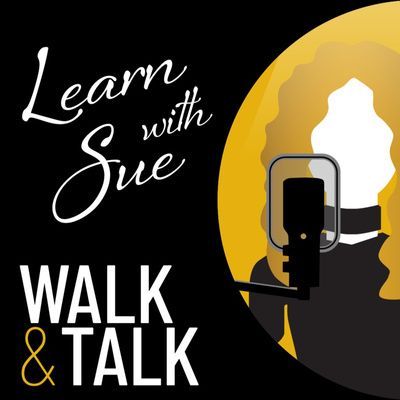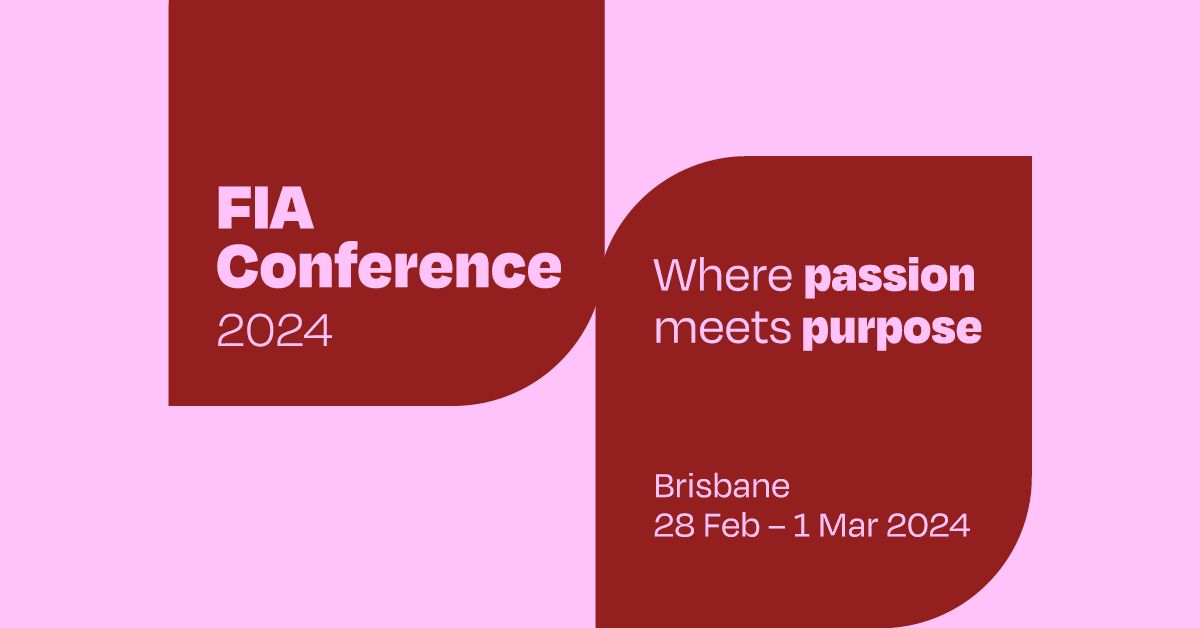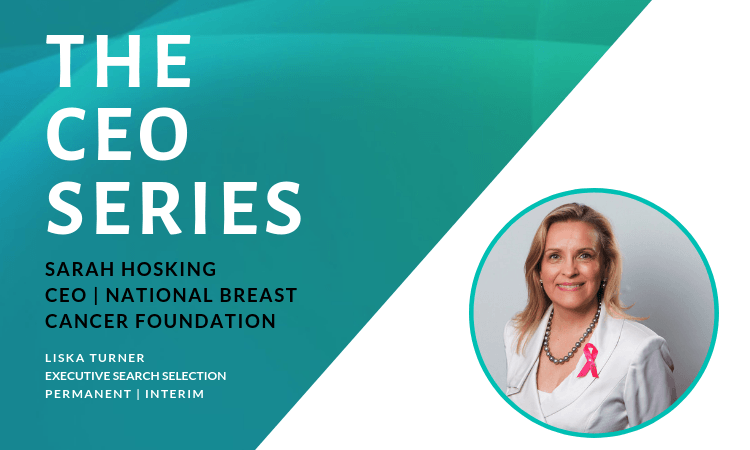The CEO Series: Q&A With Sarah Hosking, CEO At National Breast Cancer Foundation
The CEO Series: Leadership Observations From The Front Line
Interviews with CEOs from the For-Purpose sector with Liska Turner.
For-Purpose leaders are as diverse as the organisations that they lead. Every couple of months I sit down with a CEO where they share their experiences and thoughts on leading a for-purpose organisation. This month I had the pleasure of talking to Sarah Hosking, CEO at National Breast Cancer Foundation.
Sarah Hosking, CEO at National Breast Cancer Foundation
Sarah Hosking is a clinician and researcher having spent 25 years in academia, latterly as a professor in both ophthalmology and optometry in institutions in Australia, the UK and China. She is an experienced CEO and Non Executive Director, having held a number of roles in health, research and education.
Sarah has a proven track record in business start-up, turnaround, development and change management and extensive knowledge of private, government, primary and acute health sectors across a broad range of disciplines, with special interests in paediatric palliative care, vision and eye health and more recently in breast cancer. In addition to her current role as CEO of the National Breast Cancer Foundation, Sarah is currently a Non Executive board director of the Australian Communities Foundation, The Cruising Yacht Club of Australia Sailing Foundation and Rippling Ltd.
CEOs lead from the front. What are the most important decisions you make as a leader of your organisation?
Decisions are all about people and by that, I mean staff. It is doing the right thing so that they feel recognised and valued from their initial recruitment until the day that they leave. The decision to hire people who are a fit for your culture is as important as their skills. It is a decision about who to partner with internally, and then how to support your staff when it’s time for them to leave the business. When they leave, we try to celebrate their decision for change and personal growth. This helps build an alumni and a referral network for the organisation. What is your best habit? Leaving my door open. I always do and I always have. My team know that when the door is open, they are welcome to walk through it.
I am a really positive person. My cup is not just half full, I have a ‘my cup runneth over” approach. I always believe we can do it or that we should at least try. I tell my team that we can try and if it doesn’t work, it’s okay because we have learnt from the experience.
Role modelling positivity to the team is important, especially when things are tricky for some reason because your staff look to you in those moments.
Culture is fundamental to organisational success. How do you help new employees understand the culture of your organisation?
First of all, recruit to culture. I’d rather engage a new employee that is a great fit and positive addition to the team, than a talented person who becomes a negative influence within the business.
Build an onboarding program. That is really important. I am part of that onboarding process. After a month I have a one-on-one with all new staff members and tell them this is the first of as many as 1-1s as they need. This gives me the time to learn about them and they have the opportunity to realise that, even though I am the CEO, I am just as easy to communicate with as everyone else on the team, and then they relax and become more open.
Lead by example from day one.
When you are having a tough time with a business matter, and every workplace does, be vulnerable, share and talk about it to the team. That said, it’s not about bringing your personal life into the discussion - you wouldn’t know the difference if I had just won the lottery or had a fight with my husband.
Providing clarity around behaviours is important. You need to call it out when it is not right and don’t sweep it under the carpet.
Empower your people to make decisions and deliver outcomes.
No business operates in isolation. When you are considering partnering with another person or business, what factors are deal-breakers for you?
Firstly, alignment of purpose extends to values internally as well as what you are trying to do in your mission. Secondly, a reason to collaborate. I’m always open to talk to different people but ethics, and alignment of mission is vital.
Finally, thinking outside the square will create opportunities. For example, the McGrath Foundation. Yes, we are both in breast cancer, but they provide nursing care and we are in research. We communicate, share knowledge, develop and cross-train our staff.
Recently, NBCF has established Rippling, a joint venture company with 3 other major charities. At first glance, the four charities appear as though we have nothing in common, however, we are aligned by our common purpose to engage with donors in an ethical and sustainable way.
Succession planning is key to building a sustainable organisation. How do you choose who to promote?
Opportunity, skills, quality and demonstrated growth in the existing role. A desire to retain the person in your organisation. You might even be thinking ahead a couple of promotions.
That said, if they are not aligned to the values and mission of the business then there is no scope for promotion.
I am a great believer that employees have to bring your whole skill set to work. We as employers then have a duty to maximise the opportunity to use your strongest skills and to help you get to the next level by identifying the gaps in your skills for which you need support, and also, where possible, recognising employee’s skills that are not defined by their position description but could add value to the business.
Where do you draw your support and inspiration from as a leader?
My inspiration is from my PhD supervisor, not so much scientifically or intellectually, but rather the way he chose to interact with people. He saw it as his personal mission to make sure that the people around him were happy. I have never forgotten that.
My support comes from other leaders in the sector. I call it the sisterhood. We are peer CEOs, who meet socially 3 or 4 times a year and talk about what’s going on for us, our organisations and in the sector. The role of the CEO is quite unique. What advice would you give someone going into a CEO leadership role for the first time?
- Assess the landscape, especially the people.
- Deal with one thing at a time, just putting one foot in front of the other initially.
- Pick your battles carefully.
- Respect the team and the knowledge they have that you can learn from. It helps to show them that you are willing to learn from them.
- Don’t expect to be thanked or congratulated it’s your job but instead just enjoy the process!
What leadership decision are you most proud of?
There are two.
The first one is the ethical overlay we now have over who we partner with, how we invest our funds and how we invest to support our purpose.
When I first came to NBCF, I observed we had partnerships that were misaligned to our job of finding a cure for cancer. We went through a huge project reviewing all products with all levels of the team to test any partners that were misaligned. It was much more complicated than we expected. Through that process, we stepped away from some partnerships and identified new ones.
We also shifted our investment funds into an ethical portfolio.
This even informed how we celebrate as a business. We have a no-alcohol policy and provide low sugar healthy food at staff events.
This process took a lot of workshopping and a lot of internal reflection. Trust me, we are not perfect we still get it wrong sometimes, but we clear on where we want to be.
Secondly, very early on I decided that as we are a research organisation this needed more broadly reflected in our strategy. With the support of the board, I organised a strategy day focussed entirely on research. A specialist facilitator hosted the event and we invited a diverse group of people to the table. They did not all speak the same research language, but they were united by a passion for knowledge of research.
This was a “thinking outside the square” exercise that shaped a new strategy that has been successfully implemented and has even impacted the external landscape that we operate in.
You can connect with Sarah and NBCF at:
LinkedIn: Sarah Hosking
LinkedIn: National Breast Cancer Foundation
Facebook: National Breast Cancer Foundation @NBCFAustralia
Twitter: @NBCFAus
YouTube: National Breast Cancer Foundation
Share This blog
Recent Articles










